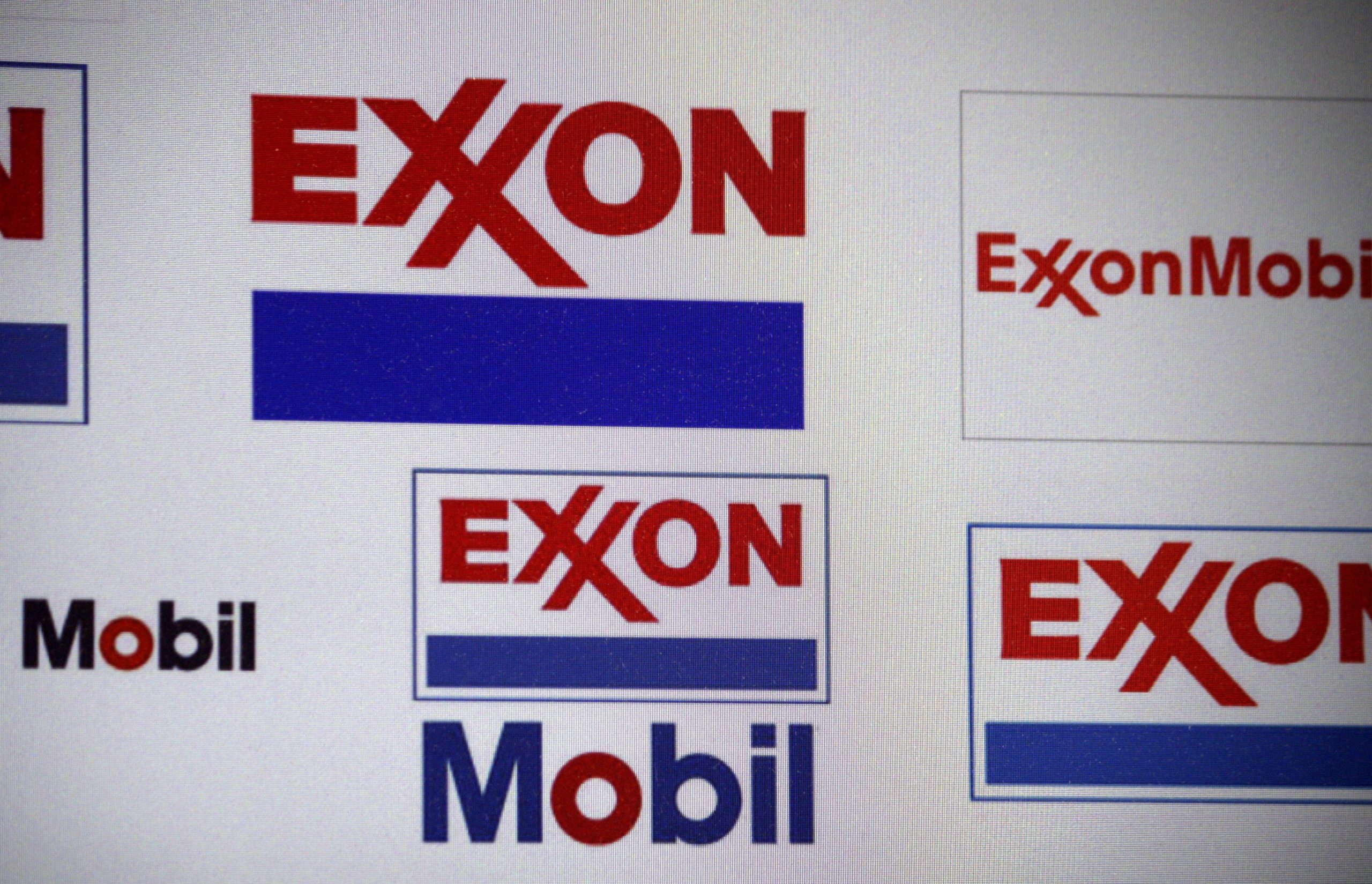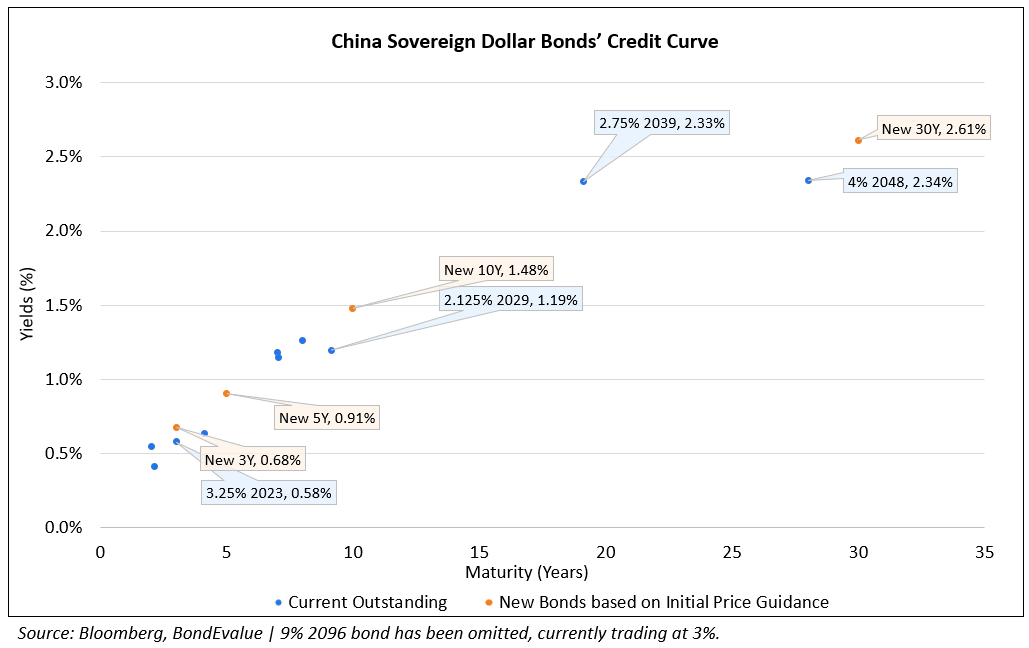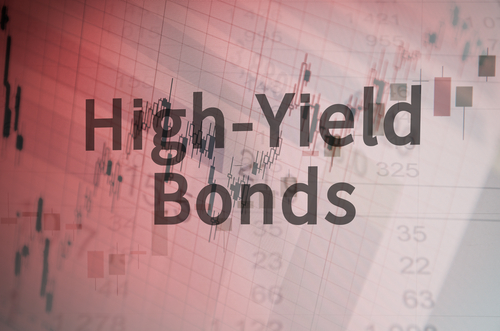This site uses cookies to provide you with a great user experience. By using BondbloX, you accept our use of cookies.
Bond Market News
HK Airport, Kaisa, Fosun, Fantasia Launch $ Bonds; 80% of $ Bonds Traded Up in Nov; Sri Lanka’s Bonds Fall on Downgrade
December 1, 2020


US equities slipped as S&P closed lower by 0.5% while Nasdaq was flat. European equities were much weaker as the FTSE and CAC fell 1.59% and 1.42%, though the DAX held up better with a 0.33% decline. US 10Y Treasury yields stayed nearly unchanged and continued to trade in the narrow range between 0.8%-0.9%. The DXY (US Dollar Index) fell to its lowest in two years to 91.69. President elect Biden yesterday confirmed Janet Yellen as his Treasury Secy. nominee. US IG CDS spreads tightened 1.1bp and HY spreads tightened 4.3bp. EU main CDS spreads were flat while crossover CDS spreads tightened 1.3bp. Asia ex-Japan CDS spreads were wider 0.9bp and Asian equities are off to a solid start today with most indices up ~1%.
Bond Traders’ Masterclass – One Day to Go
Sign up for the upcoming sessions on Understanding New Bond Issues & Credit Rating tomorrow, December 2 and Using Excel to Understand Bonds on Thursday, December 3. These are more advanced sessions focused on the primary markets, credit ratings and using Excel for bond calculations. These modules are specially curated for private bond investors and wealth managers. Thursday’s session has limited seats as it is a hands-on interactive session conducted by ex-Credit Suisse trader George Thomas so do sign up before seats sell out. Click on the image below to register.
Register today to avail a 12.5% discount on the Masterclass package

New Bond Issues
- Airport Authority HK $ PerpNC5.5/PerpNC7.5 at 2.75% area/3.1% area
- Kaisa Group $ 364 day sustainable bonds at 7.5% area
- Fantasia tap $ 9.875% 2023 at 10.45% area
- Fosun International tap $ 5.95% 2025 at 5.9% area
- Fujian Yango Group tap $ 11.875% 2023 at 11.875% area

CapitaLand Integrated Commercial Trust, previously known as CapitaLand Mall Trust (CMT) raised S$250mn ($187mn) from a 12Y bond at a yield of 2.15%, or SOR+122bp, 20bp inside initial guidance of 2.35%. The bonds have expected ratings of A3/A-. Fund managers, insurance companies, banks and corporate investors bought 88% of the issue, leaving 12% to private banks. Proceeds will be used for debt refinancing, general corporate and working capital needs.
New Bond Pipeline
- China Huaneng Group $ perpetual bond
Rating Changes
- Fitch Downgrades Ciputra Development to ‘B+’, Affirms Ciputra Residence at ‘A(idn)’; Outlook Stable
- Samsung P/C China Ratings Placed On CreditWatch Negative On Dilution Of The Parent’s Shareholding
- IHS Markit Ltd. Ratings Withdrawn On Merger with S&P Global Inc.
November 2020: Dollar Bonds Rally Across The Board on Vaccine Hopes

November was a cheerful month for bond investors as 80% of the dollar bonds in our universe delivered a positive price return, excluding coupon. A risk-on tone was seen with 89% of high yield dollar bonds trading higher while 75% of investment grade bonds rising in November.
Sri Lanka Bond Tank 2-5% After Fitch Downgrade
Investors reacted sharply to the news of the Fitch’s downgrade of Sri Lanka with its dollar bonds falling 2-5% on Monday. Fitch downgraded the nation to CCC, just three ratings above default. The downgrade comes close on the heels of Moody’s downgrade to Caa1 in September. Although, S&P continues to rate the sovereign at B-, the rating action by Fitch and Moody’s highlighted the challenges that lie ahead for the sovereign to service its external debt. The government’s external-debt repayments between 2021 and 2025 stands at ~$23.2bn. This translates to $4bn/year against FX reserves of ~$5.9bn at end-October.

The government swiftly responded by expressing its disappointment via an official statement titled “The Rating Action by Fitch Ratings based on Uncorroborated Facts sans due Consideration Given to Recent Economic and Policy Developments”. The government said, “We do not accept this downgrade as it fails to recognize the robust policy framework of the new Government for addressing the legacy issues, including the concerns raised by Fitch Ratings, and ensuring ongoing economic recovery and macroeconomic stability of the Country.” The government said that it was committed to self-reliance and highlighted the following:
- The government’s approach to foreign financing is aimed at reducing the share of foreign financing of the budget deficit over the medium term. Its strategy is to avoid total rolling over of upcoming foreign debt maturities and to repay outstanding debt, while not raising more loans medium term
- The forward looking financing model of the government depends majorly on domestic financing and will benefit from increased domestic savings and the low interest rates
- Low interest rate regime will improve economic growth prospects in the period ahead
- The economy is expected to recover in 3Q2020. Merchandise exports returned to pre-COVID monthly averages of $1bn, ahead of expectations. Trade deficit has been reduced by curtailing non-essential imports for the 6th straight month, saving $3.3bn in import expenditure
- Gross official reserves were estimated at $5.9bn at end October 2020, with an import cover of 4.2 months. This is expected to improve to ~$6.5bn by end 2020 on the back of foreign direct investments, foreign exchange swaps and its financing facility from China Development Bank
For the full story, on rating action, click here and for the Government response, click here
Exxon Mobil To Writedown Assets Worth $17-20 Billion
US energy company Exxon Mobil in a release yesterday said that it will write down the value of it North and South American natural gas fields by $17bn-$20bn. The release stated, “Assets removed include certain dry gas resources in the Appalachian and Rocky Mountains, Oklahoma, Texas, Louisiana and Arkansas in the United States, and in western Canada and Argentina. The decision will result in a non-cash, after-tax fourth quarter impairment charge of approximately $17 billion to $20 billion”. From being the largest company in the S&P 500 Index in 2012, Exxon now ranks just inside the top 50 as energy lost share and tech grew. The writedown stems from former CEO Tillerson’s decision to buy XTO Energy for $35bn a decade ago as against building an in-house shale business when the outlook for North American gas prices was bright given higher demand. Rival Chevron recorded an impairment of over $5bn on Appalachian gas a year ago, and recently agreed to sell those fields to EQT Corp. for about $735mn. Exxon’s 4.227% 2040s were up 0.9 to 123.39, yielding 2.64%
For the full story, click here
70 Chinese, Foreign Banks Have $5.1 Billion Worth of Exposure to Huachen
Huachen Automotive Group, the parent company of BMW’s JV partner in China, Brilliance Automotive owes CNY 33.5bn ($5.1bn) in outstanding debt to almost 70 Chinese banks, foreign banks and trust companies combined, as per the FT. The news comes after a series of defaults by Chinese SOEs in the last month. Huachen owes CNY 2.5bn ($380mn) to two of China’s big state-owned policy banks, China Development Bank and Export-Import Bank of China. They also owe CNY 2.64bn ($400mn) to China Construction Bank (CCB) and ICBC. Huachen’s largest foreign creditor is Singapore’s DBS, to which they owe CNY 779mn ($118mn). “Gone are the days when Chinese banks could roll over troubled debt indefinitely to make their financial statements look good”, said Wei He, an analyst at Gavekal Dragonomics. DBS said, “A failure to deal with Huachen’s debt issue will shake the confidence of foreign institutions and global investors including DBS, in the business environment and economic prospects of Liaoning and northeastern China.”

For the full story, click here
First REIT Signs MOU On Rental Pacts with Lippo Karawaci
Singapore-listed First REIT has signed a memorandum of understanding (MOU) to restructure rental pacts with major tenant and shareholder Lippo Karawaci (LPKR), the parent of Lippo Malls. The MOU is a result of negotiations based on a master lease restructuring proposal that was unilaterally submitted in September by cash-strapped LPKR. Under the MOU proposals, all leases will be extended to December 31, 2035 with an option to extend for another 15 years by mutual agreement. The rental will be the higher of either the proposed base rent or a variable rent.
The annual aggregate base rent from January 1, 2021 is projected to be ~S$50.9mn ($38mn) with a fixed annual increment of 4.5%. This is higher than the current increase capped at 2%. The higher annual increment would be to offset foreign exchange risk, which First REIT will have to bear under the restructuring proposal. An OCBC credit note projects a 30% drop in the property trust’s asset valuation based on the rental restructuring that may lead to a sharp rise in First REIT’s aggregate leverage ratio to 48.6% from 34.9% as of end-June. This will be close to a 50% leverage limit imposed by the MAS on Singapore-listed REITs. First REIT will need approval from its unitholders and bank lenders for the restructuring terms.
First REIT’s SGD 5.68% Perps were up 0.05 to 72.04 while Theta Capital (the issuer of LPKR’s bonds) saw their dollar bonds move higher – their 8.125% 2025s up 1.45 to 98.95 and 6.75% 2026s up 1.6 to 90.9.
For the full story, click here
Tianqi Lithium Lives to See Another Day With Dollar Loan Extension
Chinese lithium producer Tianqi Lithium Corp said on Monday that it has received an extension from a syndicate of banks to extend the maturity date on its $1.884bn of loans by a month. Yesterday, we had written about how Tianqi was in talks with lenders led by Citic Bank to negotiate terms on its dollar loans, failing which the company was staring at a default. The extension gives Tianqi until December 28 to sign a modified loan agreement, as per a Shenzhen Stock Exchange filing. If it fails to close an agreement, it would have to repay the loans by that date. The extension letter carries certain conditions, which if not met, will not allow a further extension thereby leading to a default. Daiwa Capital Markets said in a note, “We expect Tianqi to reveal a solution for the repayment of the annexation loan within a month, potentially a strategic investment or sale of Australian assets amid a rebound in the lithium price.” Tianqi, alongside Albemarle Corp, jointly operates the Greenbushes lithium mine in Australia, where it also owns the Kwinana processing plant. Tianqi Finco’s 3.75% dollar bonds due 2022 traded stable at 39.5 cents on the dollar on the secondary market.
For the full story, click here
Term of the Day
Convertible Bonds
As the name suggests, convertible bonds are debt instruments issued by a company where the bonds can be converted into equity shares of the company by the bondholders at a particular ratio and at particular points in time. Thus, it is a hybrid security as it has characteristics of both debt and equity. Convertibles generally carry a lower coupons and sometimes tax advantages for the issuer. Recently, Singapore Airlines received regulatory approval for issuance of convertible bonds due 2025.
Talking Heads
“These programs serve as a backstop to key credit markets and have helped restore the flow of credit from private lenders through normal channels,” Powell said. “We have deployed these lending powers to an unprecedented extent.” “It remains difficult to assess the timing and scope of the economic implications of these developments with any degree of confidence,” he added, referring to recent news on vaccines.
“The evidence we have from Europe and other European countries (that have cut rates below zero) is that the lending channel of the transmission of monetary policy has worked,” Tenreyro said. “And apart from the bank lending channel I would expect the other channels to also work well – the exchange rate channel, and the wealth or asset price channel.”
“Additional stimulus will be needed to facilitate a sustained increase in inflation,” the IMF said. “Expanding asset purchases will be the first line of defense.” “Risks are dominated by pandemic dynamics,” it said. “They remain clearly to the downside through early 2021 given the ongoing second wave.” “A clear, transparent, and well-communicated symmetric inflation point target has significant benefits,” the IMF said. “We recommend formally codifying the Governing Council’s recent emphasis on the symmetry of the inflation aim and changing that aim to a specific point target.”
On the finding that most sovereigns face ‘significant negative shock’ from COVID-19
According to a top sovereign analyst at Moody’s
“Most (sovereigns) face a significant economic loss, a marked increase in their debt burden, and some, in particular emerging markets, face a deterioration in debt affordability”, the analyst said.
Marie Diron, managing director of the Moody’s Sovereign Risk Group
“We have not changed our forecasts based on recent developments in progress on vaccine trials since they remain consistent with our general assumptions that some easing of the pandemic is likely next year, although only gradually”, Diron said. “The recovery will proceed at different paces in different countries, in part depending on the speed of return to normalcy, in part depending on the varied capacity of economies to recover from a shock”, Diron added.
On junk bonds enjoying stellar November and riskiest debt outperforms
Andrey Kuznetsov, fund manager at Federated Hermes
“We’ve cleared quite a few hurdles recently. Elections are behind us, the first vaccines are coming out, so positive developments on both fronts propelled the markets higher and removed quite a bit of the risk premium that was there,” said Kuznetsov.
Ben Thompson, JPMorgan head of EMEA leveraged finance capital markets
“What’s gone off the table is the sense that more challenged businesses are going to face some kind of short-term liquidity crunch, and that’s a huge source of relief for investors,” said Thompson. “There’s enough yield in these recent deals that if the world is anywhere near normal next year, investors could feel pretty smart for having bought them,” Thompson said.
On bonds aimed at heavy corporate emitters set to roll out in 2021
Marisa Drew, Credit Suisse Group AG’s chief sustainability officer
Next year “will be a ramp-up phase for transition instruments,” said Drew. “We’ll have some experimental issuers tap the market and then we’ll see many investors lining up.”
Daniel Klier, HSBC Holdings Plc’s global head of sustainable finance
“I don’t think anybody thought in January, and certainly not since we became aware of the gravity of Covid, that this would be such a busy year for green bonds,” said Klier. “It helped that governments and central banks put green topics at the heart of their recovery plans and that companies with superior environmental, social and governance profiles performed better in the crisis.”
Mario Eisenegger, money manager at M&G Investments
“If done right, transition bonds can offer an important additional asset class for issuers alongside green bonds, and with that help to prevent greenwashing in the green bond market,” Eisenegger wrote.
On the revelation that that Huachen owes banks billions
Wei He, an analyst at Gavekal Dragonomics
“Gone are the days when Chinese banks could roll over troubled debt indefinitely to make their financial statements look good,” said Mr He.
In a statement by DBS
“A failure to deal with [Huachen’s] debt issue will shake the confidence of foreign institutions and global investors, including DBS, in the business environment and economic prospects of Liaoning and northeastern China.”
“Turkey’s main trading partners across Europe lost momentum in the fourth quarter due to various restrictions imposed to regain control over the coronavirus pandemic,” said Matys. “Exports are likely to contribute less to growth in the fourth quarter than in the third at a time when private consumption will be curtailed by slowdown in credit growth.”
Top Gainers & Losers – 1-Dec-20*

Go back to Latest bond Market News
Related Posts:








